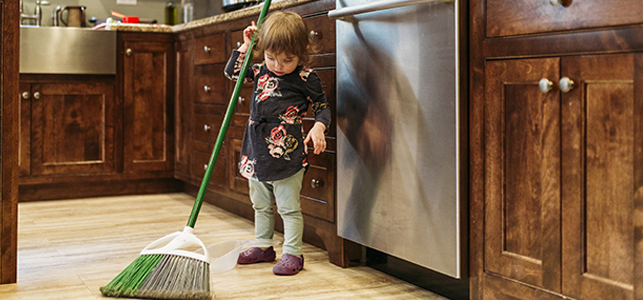
Ahhhh, spring cleaning – a time to de-clutter and freshen things up. Unfortunately, it’s also a time when our Virginia Poison Center gets a lot of calls about kids ingesting or being exposed to chemicals from cleaners and disinfectants.
“Young children are at high risk for poisonings from cleaning products. It makes sense because the adults are busy trying to get the chores done. It only takes a second for Mom, Dad or Grandma to look away and a curious little one to get into something they shouldn’t,” said Fiorella Carhuaz, education specialist at the Virginia Poison Center. “Because kids’ bodies are small and their metabolisms are fast, even a small amount can have dangerous consequences.”
The risk doesn’t stop with swallowing. Cleaners and disinfectants can get into the eyes, nose or throat, or in some cases even on the skin, and cause problems too.
What can be done to help keep kids safe during hectic spring cleaning, and throughout the year? Fiorella has some answers.
 During the pandemic, hand sanitizer has been a big one. To be effective at killing germs hand sanitizers must contain alcohol, which can be especially toxic for kids. Many hand sanitizers are even sold in packaging geared toward children, with bright colors and fun characters that may resemble the packaging of their favorite snacks. Despite the appeal, these products should ONLY be used with adult supervision.
During the pandemic, hand sanitizer has been a big one. To be effective at killing germs hand sanitizers must contain alcohol, which can be especially toxic for kids. Many hand sanitizers are even sold in packaging geared toward children, with bright colors and fun characters that may resemble the packaging of their favorite snacks. Despite the appeal, these products should ONLY be used with adult supervision.
Bleach and laundry detergent are also common reasons people call Poison Control. We get quite a few calls about laundry pods in particular. Any cleaning product, from toilet cleaner to dusting spray, can be hazardous though.
Young children imitate behavior and often want to help out with chores, which is great! It's best to leave the cleaning to the adults in the home, but there are ways kids can pitch in.
Here are few safer, but still helpful, responsibilities:
As kids mature, they can have increased responsibility around the home. If you’re going to involve older children in cleanings tasks, rely on their abilities rather than their age when determining what’s appropriate. Their pediatrician can help if you’re unsure.
Accidents can happen to anyone.
Save the Poison Center number (1-800-222-1222) in your phone and call right away if an accident occurs! It’s a good idea to post it on the refrigerator for easy reference too.
Don’t wait for your child to look or act sick before calling – the quicker a medical professional can provide guidance, the better.
If you’re looking for some organization inspiration this spring, check out The Container Store that just opened in Richmond and is donating a portion of its in-store and curbside pickup proceeds to CHoR between March 22 and April 18, 2021.